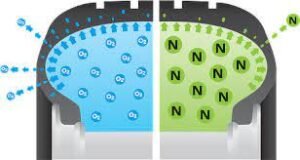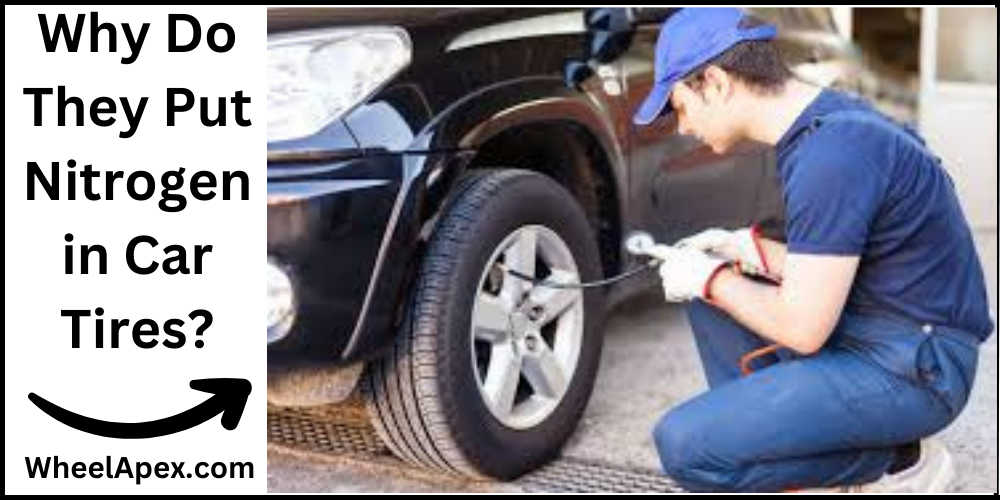Have you at any point asked why vehicle tires are loaded up with nitrogen rather than outright old air? It might appear to be a minor detail, but, the selection of gas inside those elastic wheels can fundamentally affect your driving experience. Nitrogen has become progressively famous in the auto business, with numerous producers and tire shops suggesting it as the best decision for expanding tires. What precisely is the thinking behind this pattern?
Why Do They Put Nitrogen in Car Tires? In this article, we dive into the fascinating universe of tire filling and investigate the justifications for why nitrogen has arisen as the go-to choice for upgrading execution, security, and life span out and about. Prepare to find the science behind why they put nitrogen in vehicle tires and how it can add to a smoother ride for drivers like you.
Contents
Why Do They Put Nitrogen in Car Tires?
At the point when you take your vehicle to a tire search for a substitution or upkeep, you might have gone over the choice of filling your tires with nitrogen rather than standard air. While nitrogen might appear as an uncommon decision for something as basic as tire filling, there are convincing explanations for this training.
We plan to reveal insight into the justifications for why nitrogen is utilized in vehicle tires, framing the advantages it offers and the logical rules that make it an engaging decision.
The Essentials Nitrogen versus Normal Air
Before diving into the explanations behind involving nitrogen in vehicle tires, understanding the central distinctions between nitrogen and customary air is fundamental.
While the air we inhale is made out of roughly 78% nitrogen, and 21% oxygen, and follows measures of different gases, nitrogen tire filling includes cleansing the tire of the current air and supplanting it with almost unadulterated nitrogen gas, commonly at an immaculateness level of 95-close to 100%.
Advantages of Nitrogen Tire Filling

- Keeping up with Tire Strain for Longer
One of the essential benefits of involving nitrogen in tires is its capacity to hold strain for a more stretched-out period contrasted with normal air. Nitrogen particles are bigger than oxygen atoms, and that implies they are less inclined to penetrate through the elastic tire walls.
This decreased saturation keeps up with tire tension after some time, bringing about more steady and reliable filling. Appropriately swelled tires add to all the more likely eco-friendliness, further developed dealing with, expanded track life, and upgraded in general wellbeing.
- Limiting Tire Maturing and Oxidation
Oxygen in standard air can add to tire maturing and oxidation processes. As oxygen responds to the elastic mixtures in the tire can become loud, it can prompt the arrangement of free extremists and prompt the elastic to disintegrate.
Nitrogen, being a latent gas, doesn’t respond to the tire’s materials, diminishing the maturing system and broadening the tire’s life expectancy.
- Decreasing the Gamble of Victories
The security of tire pressure presented by nitrogen filling limits the gamble of victories. At the point when tires are appropriately expanded, they create less intensity, which diminishes the possibility of tire disappointment because of overheating.
Nitrogen’s steady strain likewise guarantees a more unsurprising and controlled tire execution, particularly under high-stress conditions, like during long drives or while conveying weighty burdens.
- Further developed Execution in Outrageous Temperatures
Nitrogen-filled tires display better execution in outrageous temperature conditions. Not at all like customary air, nitrogen doesn’t extend or contract as much with temperature variances.
This property limits the tension replaced inside the tire, giving more reliable execution and diminishing the gamble of over-filling, which can influence taking care of and footing.
Logical Clarification

The logical standards behind the advantages of nitrogen tire filling lie in the special properties of nitrogen gas. Nitrogen atoms are bigger and less porous than oxygen particles, bringing about slower spillage rates through the tire’s elasticity.
Moreover, nitrogen’s absence of reactivity with the tire materials diminishes the oxidation and corruption processes, prompting longer tire life or you can sell your tires. These properties joined with the steady tension attributes of nitrogen, add to further developed tire execution, well-being, and life span.
Do I Need Nitrogen in My Tires?
You ought to have nitrogen in your tires. Nitrogen keeps up with stable tire pressure longer, further developing eco-friendliness and tire life. It likewise limits dampness and oxidation inside the tire, diminishing erosion and upgrading safety. While not fundamental, nitrogen offers benefits for keeping up with ideal tire execution and security.
Can You Mix Nitrogen And Air in Tires?
It is protected to blend nitrogen and air in tires, it’s excessive for most vehicles. Nitrogen can assist with keeping up with tire pressure steadiness somewhat better than air because of its lower dampness content, yet the thing that matters is insignificant. Customary tire upkeep, no matter what the filling source, is key for security and execution.
What Are The Disadvantages of Nitrogen-Filled Tires?
Nitrogen-filled tires offer benefits like better tension maintenance and more steady tire temperatures. Nonetheless, disservices incorporate restricted availability, cost, and negligible true execution enhancements for most drivers. Standard air is a useful and practical decision for keeping up with legitimate tire tension for most vehicles.
Is Nitrogen Better Than Air In Tires?
Nitrogen is liked over customary air in tires in light of multiple factors. Nitrogen particles are bigger and less inclined to spillage, bringing about more steady tire pressure. It decreases oxidation and forestalling consumption inside the tire. Nitrogen additionally keeps up with tire pressure better across temperature variances, further developing eco-friendliness and tire life span.
Conclusion
While nitrogen-filled tires have acquired notoriety lately, it’s critical to take note that the advantages are more articulated in unambiguous circumstances, like superior execution vehicles, business armadas, or in outrageous temperature conditions. For ordinary traveler vehicles, the advantages might be less perceptible yet present.
Deciding on nitrogen expansion might accompany an ostensible expense, as devoted nitrogen-filling hardware is required. Nonetheless, the drawn-out benefits, including further developed tire pressure maintenance, decreased maturing, upgraded security, and better execution, make it a beneficial speculation for some drivers.
Last, the choice to involve nitrogen in vehicle tires is an individual decision, taking into account one’s driving propensities, the environment one experiences, and the vehicle’s necessities. It’s fitting to talk with tire experts and gauge the upsides and downsides in light of individual conditions.
Sources:
- By Craig Lister Why do people put nitrogen in tires? Posted 2 Years Ago.

